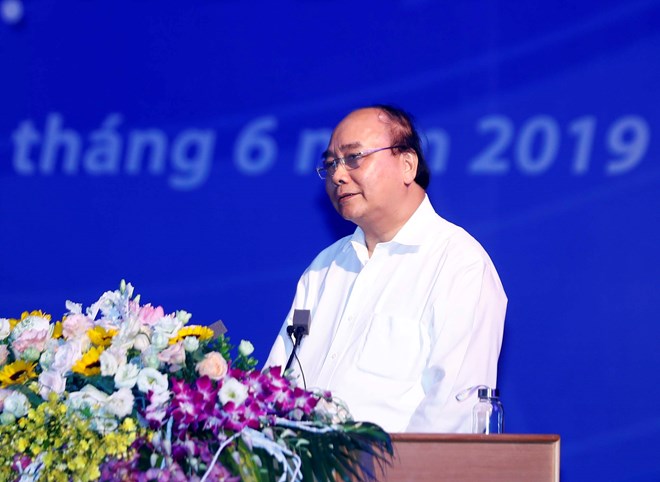
Prime Minister Nguyen Xuan Phuc speaks at the conference. (Photo: VNA)
The Government leader highlighted the region’s strategic importance in terms of politics, society-economy, and defence-security, adding that it is the second biggest economic region nationwide and the only region where all localities contribute to the central budget.
The region has nearly 80 percent of communes recognised as new rural areas and the lowest rate of poor households – 2 percent, Phuc said.
He asked regional localities to reform policies in investment, finance, land, human resources, as well as pay attention to institutional reform and improve regional coordination mechanism.
The PM pointed to shortcomings in the region such as unsustainable growth of the service sector, which is the region’s strong point but its proportion in the economic structure is declining; small-scale agricultural production with out-of-date cultivation techniques and processing technology; weak connection in production and business; and environmental pollution in urban and rural areas, river basins, trade villages, and industrial clusters.
Most of foreign direct investment (FDI) projects focus on sectors and industries subject to investment incentives and using low-cost labour. Industrial projects are mainly concentrated in Hanoi, Hai Phong and Bac Ninh such as Samsung, LG, Microsoft and Canon, and just stop at processing and assembling with low added value, the PM noted.
The region should maintain its role as the country’s centre of politics, economy, culture and science-technology, and strive to become one of the nation’s two biggest economic hubs besides the southern key economic region, he said.
The region must take the lead in science-technology and innovation as well as economic restructuring, the PM requested.
He also urged the region to push ahead with building rural areas and reforming administrative procedures, improving business environment, preventing corruption and wastefulness, and ensuring social safety for people.
Regional linkage was a focal point at the conference, with leaders of localities proposing several measures to promote regional connectivity.
Chairman of the Hanoi municipal People’s Committee Nguyen Duc Chung submitted six key measures, emphasising on the development of transport network, industrial parks, clean water supply, waste treatment, housing and environmental protection.
Chairman of the Hung Yen provincial People’s Committee Nguyen Van Phong proposed the Government support Hanoi and Hung Yen to implement some transport projects, including the connection of expressways of Hanoi – Hai Phong and Cau Gie – Ninh Binh.
Leaders from Quang Ninh province suggested speeding up the construction of Hanoi-Cai Lan railway and building a high-speed rail route linking Hanoi, Hai Phong and Quang Ninh.
The northern key economic region, comprising Hanoi, Hai Phong, Bac Ninh, Quang Ninh, Hai Duong, Hung Yen and Vinh Phuc, covers nearly 16,000 square kilometers, making up 4.7 percent of the country’s total area. It has a population of over 16 million, accounting for 17 percent of the nation’s total population.
The region boasts a modern and synchronous transport infrastructure network linking regional localities such as the Hanoi – Hai Phong, Hanoi – Cau Gie – Ninh Binh, Hanoi – Thai Nguyen, Hanoi – Lao Cai, and Ha Long – Hai Phong highways, along with domestic and international airports such as Noi Bai, Cat Bi and Van Don, and important seaports like Lach Huyen and Cai Lan.
According to Minister of Planning and Investment Nguyen Chi Dung, the region’s average gross regional development product (GRDP) growth exceeded 9 percent in 2016-2018.
Last year, its total GRDP made up about 31.73 percent of the country’s GRDP, ranking second after the southern key economic region. The region contributed over 31 percent of the State budget’s revenues and over 30 percent of national exports.
The total development investment in the region reached nearly 1.6 quadrillion VND (70 billion USD), making up 29.76 percent of the country’s total investment.


















